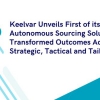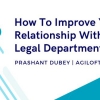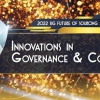Peter Dickinson is a partner at international law firm Mayer Brown and co-leads their global Technology Transactions practice; he's also a hugely respected thought leader and a regular contributor to Outsource, offering insight on a broad range of legal and technological issues. A perfect fit, in other words, for our Life Lessons series: take it away, Peter...
What has been the single most significant development to impact your profession or area of business during your career, and why?
I began practicing law in 1986. During the last 30 years, the legal profession has changed almost beyond recognition. Two factors have had the most significant impact: First, in response to globalisation, law firms have had to increase significantly in terms of sheer scale, but also geographic coverage. International clients want law firms who can support them across multiple jurisdictions and can advise them on the legal/regulatory challenges arising out of the integration of economies, industries and markets.
Second, technology has had a huge impact – both positive and negative. Positively, technology has enabled lawyers to be more efficient, agile and responsive. However, it has also caused the provision of legal advice to become "commoditised", with clients seeking the lowest cost solution and not necessarily the best advice. As lawyers, we aspire to be considered a trusted adviser. Technology has created a culture where clients expect an almost immediate response, as a consequence of which lawyers are losing the opportunity to spend time giving proper consideration to complex issues. As the saying goes, "more haste, less speed".
Similarly, what one factor has most profoundly changed the way you personally work since your first day in your first job?
Technology (again): In 1986, as an articled clerk, in order to be productive, one had to be physically present at the office, supported by a secretary (who did all one's typing on an electric typewriter), with access to a physical library. When negotiating agreements, a "travelling draft" would be sent between the opposing lawyers, with each set of amendments being marked up (in manuscript) in a different colour! Technology has become the great enabler. The ability to work remotely has revolutionised the way lawyers can deliver service. Similarly, the ability to access materials required to carry out research or examples of similar transactions, has been transformational.
What’s the biggest challenge facing your industry today – and how would you solve it?
Technology (yet again): robotic process automation and artificial intelligence will impact law, in the same way as it will impact the other professions. Already, relatively low-level activities, such as due diligence, can be carried out by sophisticated software programmes. This will, by necessity, drive a change in the structure of law firms: They will need to be able to deliver lower value/commoditised services as efficiently as possible – using a combination of technological innovation and nearshoring.
The real challenge, however, will be in relation to higher value, more bespoke activities, where the deployment of artificial intelligence will become more prevalent. I would expect all leading law firms to offer such capabilities in the near term. This means the ability to "add value" and differentiate a firm or individual lawyer from the competition, will become ever more difficult. That said, the ability to establish strong personal relationships with clients and win their trust (and instructions) will never be more important.
Who has been the most influential figure in your professional life, and why?
I began my career at the law firm Clifford Turner, which six months after my arrival merged with Coward Chance, to become Clifford Chance. I was "articled" to David Tate, one of the senior partners, who specialised in oil and gas law. David's influence, during my formative years, was significant. He was very much his own person and encouraged those who worked with him to be themselves, to always pursue excellence, to never be afraid to seek advice from others and to always respect the other side (however much one might disagree with their position (!)). He also believed in a no-fault culture (i.e. provided you had done your best, if matters went wrong, you still deserved his unqualified support). This approach is something I strive to replicate with my own team.
What’s the biggest mistake, work-wise, you’ve ever seen – and what were the consequences?
As a lawyer, my overriding goal is to help facilitate my clients' commercial objectives. Although there may be occasions when a "mistake" has a major impact, in most cases, they simply throw up additional challenges for us to overcome. Therefore, it is never helpful to categorise events as "mistakes". Instead, there are new matters, facts and circumstances which require to be analysed, their impact considered and a new solution found. Thankfully, it is rare that any one matter, fact or circumstance will be fatal to the achievement of an overriding commercial objective. There is almost always a "work around", even if it may be time consuming and/or could give rise to additional costs.
What’s the most awkward work-related conversation you’re ever had?
When I was a relatively junior lawyer, the head office of a large publically listed conglomerate corporate client asked me to travel to the North West, to personally deliver a letter terminating the employment contract of the managing director and founder of one of their subsidiaries with immediate effect (due to irreconcilable views of future strategy) and to try and obtain his signature acknowledging the termination. I arrived unannounced – only to discover that it was the managing director's birthday (and his wife had come to take him out for a surprise lunch). I reluctantly delivered the message (as instructed), trying to be as sensitive and respectful as I could be in all the circumstances. To my surprise, I was then asked to join him and his wife at lunch.
What do you consider to be your greatest achievement career-wise?
To remain relevant and current: My practice has by necessity evolved throughout my career. A brief move in-house (to Cable & Wireless) began my interest in the telecoms sector. My career – like the telecoms industry itself - has subsequently evolved into a focus on TMT as a whole and technology transactions in particular. With the advent of the so-called 4th Industrial Revolution, a whole array of new legal challenges are being thrown up and will require to be addressed.
What’s your biggest (as-yet) unfulfilled ambition – and are you going to achieve it?
I am fortunate to have achieved the majority of the ambitions I set myself at the outset of my career. However, I remain ambitious – to be given the opportunity to overcome new (as yet) unidentified challenges whether in the field of law or elsewhere.
What three words do you think your colleagues and peers would use to describe you?
Positive, pragmatic and persuasive.
Finally, what piece of advice would you give your younger self at the very start of your career?
There are a few... Life is not a rehearsal. If you are not enjoying what you're doing (having tried your best), go seek out other opportunities. Embrace change: see it as an opportunity and not a threat. The law is not black and white - in most cases, there is no right or wrong answer and a successful lawyer is one who recognises that their role is to identify risk, assist in finding appropriate mitigations and, to the extent all or part of a risk cannot be mitigated, to negotiate a fair and appropriate allocation of risk as between the parties.
Do you think you – or someone you know – would make a good subject for future instalments of Life Lessons? Contact hcorr@sig.org for more information…








